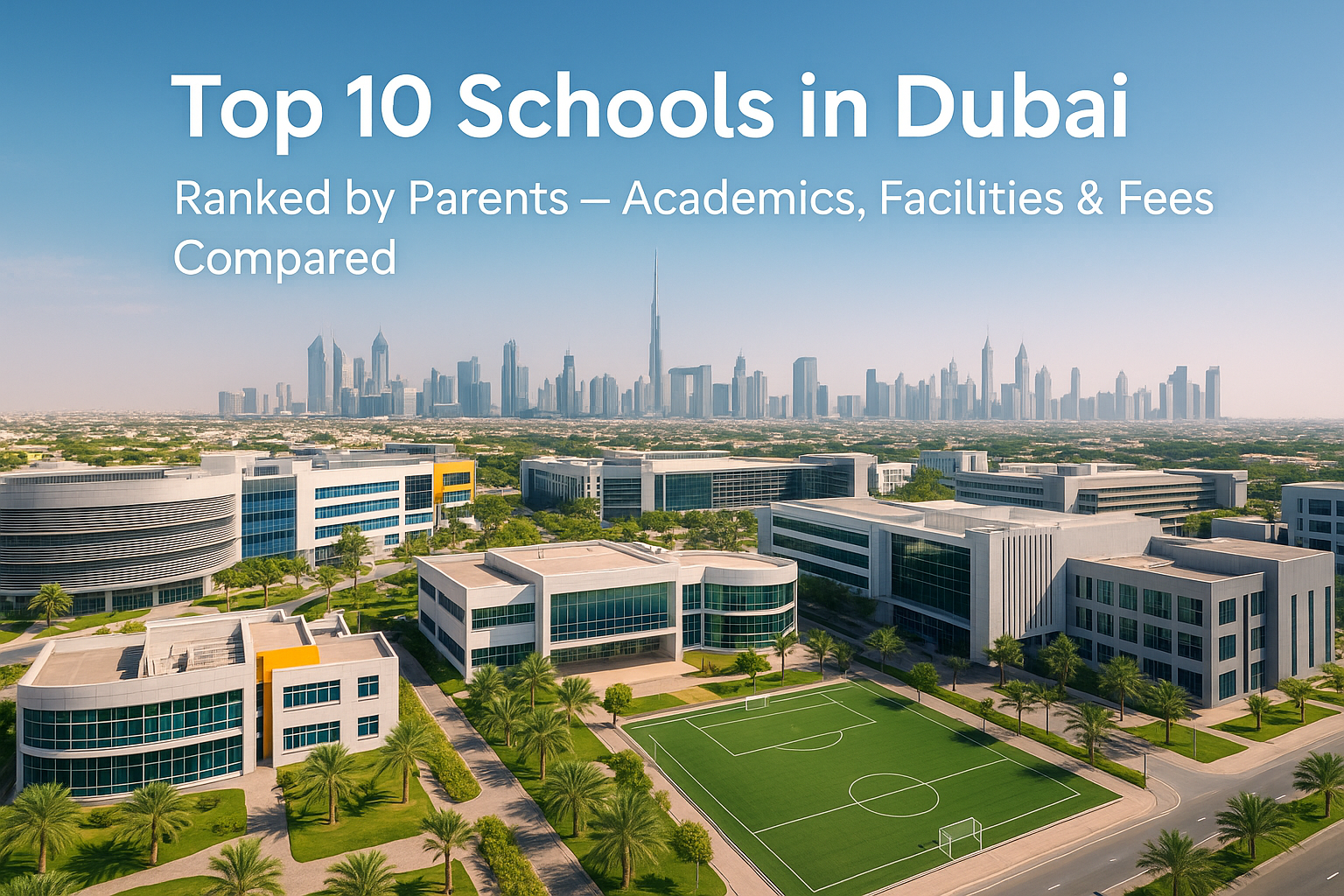Introduction: Why Dubai Is Becoming the Education Capital of the Middle East
When families move to Dubai, one of the first questions that comes up—often before housing or transportation—is, “Which school should my child attend?” With over 220 private schools catering to nearly 326,000 students, Dubai’s education sector has transformed into one of the most diverse and advanced in the world.
As the founder of App Genie AI and a parent who values evidence-driven choices, I’ve spent considerable time understanding how Dubai’s schools balance innovation, cultural diversity, and academic excellence. In 2025, the city is no longer just a hub for luxury and business—it’s a hub for world-class education.
The top 10 schools in Dubai consistently attract families from across the globe, offering everything from the British and IB curriculums to Indian and American systems. But what truly sets Dubai apart is the consistency of quality. Whether you’re looking for a high-performance British curriculum or an affordable yet reputed CBSE option, the variety here is unmatched.
And yet, the choices can feel overwhelming. School tours, KHDA ratings, fee comparisons—it’s easy to get lost in the process. That’s why this guide goes beyond basic rankings to explore how each school performs academically, how parents rate their experiences, and what facilities and innovation trends make them stand out.
Choosing the best school in Dubai today isn’t about prestige alone—it’s about fit. It’s about finding the right balance between curriculum, creativity, and community.
Understanding the Dubai Education Landscape
A Global Education Ecosystem
Dubai’s education scene reflects its multicultural identity. According to KHDA’s Annual Report 2025, more than 190 nationalities are represented across private schools, making it one of the most globally integrated learning environments in the world. The education model encourages inclusivity, offering over 17 different curriculums, including British, Indian (CBSE and ICSE), American, IB, and French.
Roughly 36% of students attend British curriculum schools, followed by 26% in Indian CBSE institutions. The International Baccalaureate (IB) curriculum is gaining ground too—favored for its university readiness and cross-disciplinary thinking.
The Role of KHDA
The Knowledge and Human Development Authority (KHDA) plays a central role in maintaining education standards. Schools are rated annually from Outstanding to Weak, based on criteria like teaching quality, student progress, and leadership. This transparent rating system empowers parents to make informed decisions rather than relying on hearsay or marketing.
For example, as per KHDA’s 2025 inspection results, 20 schools achieved the Outstanding rating, 39 schools were rated Very Good, and the rest maintained Good or Acceptable standings. These ratings directly influence fee brackets and demand—parents are more willing to invest in schools with consistent performance histories.
Why Parents Value Data-Driven Decisions
In a city where education is also a financial investment—average tuition ranging from AED 30,000 to AED 100,000 annually—parents now rely on metrics more than word-of-mouth. From fee structures to extracurricular achievements, transparency has become the currency of trust.
What makes the top 10 schools in Dubai remarkable is their ability to merge data-driven performance with human-centered learning. They don’t just rank well—they retain families year after year.
How to Choose the Right School in Dubai
What Should Parents Look For?
As someone deeply involved in tech-led decision frameworks, I often apply the same principles I use at Search Conversions to school selection—look at the metrics, understand the context, and evaluate the experience.
Here’s a parent’s version of that:
- Curriculum Alignment – Choose a system that aligns with your long-term plans. For example, if your family plans to move to the UK, a British or IB curriculum is ideal.
- KHDA Rating – Use KHDA’s inspection portal to verify academic consistency.
- Fee Transparency – Request a detailed fee breakdown, including extracurriculars, books, and uniforms.
- Cultural Fit – Does the school value diversity, inclusion, and student wellbeing?
- Innovation in Learning – Schools integrating AI, VR, and bilingual education are future-ready.
The Power of Reviews and Word-of-Mouth
While data provides structure, personal experiences shape confidence. Parent review platforms like WhichSchoolAdvisor and EdArabia reveal the softer metrics—teacher engagement, peer culture, and student happiness.
According to a 2024 WhichSchoolAdvisor survey, 78% of parents said teacher communication and personal attention were more valuable than facilities alone.
Location and Accessibility
Dubai traffic is real—and commute time often becomes a deciding factor. Communities like Al Barsha, Jumeirah, and Mirdif are favored for their proximity to top-rated schools. A shorter commute improves punctuality and allows students to participate in after-school programs.
Making the Decision
When weighing the top 10 schools in Dubai, think beyond brand names. Each school has its strength—whether it’s Repton’s British academic rigor, Swiss International’s bilingual excellence, or Indian High School’s affordability and community spirit.
Education in Dubai is no longer one-size-fits-all—it’s about personalization, adaptability, and purpose.
KHDA Ratings Explained: What Makes a School “Outstanding” in Dubai
One of the most distinctive features of Dubai’s education system is its transparency. The Knowledge and Human Development Authority (KHDA) isn’t just an administrative body—it’s the quality compass for parents making crucial schooling decisions.
Every year, KHDA evaluates schools and assigns them a rating based on a multi-criteria framework covering student achievement, teaching quality, leadership, inclusion, and wellbeing. These ratings range from Outstanding, Very Good, Good, Acceptable, to Weak.
According to the KHDA 2025 Report, 20 schools achieved the “Outstanding” rating this year—a title that reflects consistent excellence in academics, teaching innovation, and parent satisfaction. Meanwhile, 39 schools were rated “Very Good,” showing that competition among schools remains fierce and healthy.
What the Ratings Mean in Practice

📊 Fact: KHDA inspections involve over 400 education specialists evaluating teaching practices across Dubai’s 220+ private schools annually (Source: KHDA Open Data, 2025).
This system allows parents to compare schools objectively, especially as tuition fees often correlate with KHDA performance levels.
When exploring the top 10 schools in Dubai, parents aren’t just looking at academics—they’re seeking institutions that maintain emotional wellbeing, extracurricular excellence, and future-readiness.
Comparing the Top 10 Schools in Dubai (2025 Rankings)
The top 10 schools in Dubai combine academic rigor, global exposure, and advanced facilities. Each school is reviewed based on KHDA rating, curriculum, fees, facilities, and parent feedback.
1. Dubai College (British Curriculum)
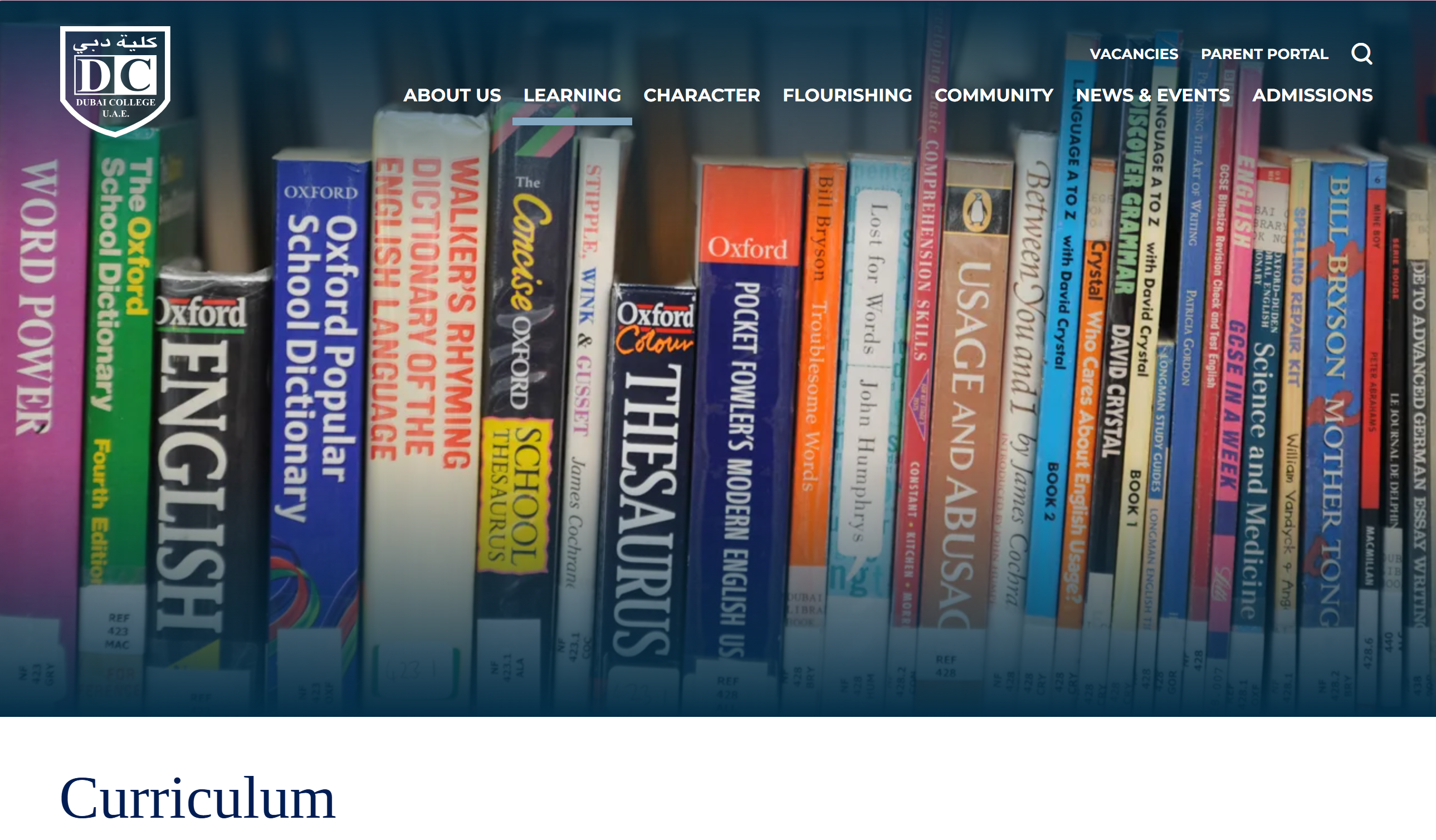
📍 Location: Al Sufouh
💰 Fees: AED 88,000–99,000/year
🏫 KHDA Rating: Outstanding
A long-standing institution known for its British A-Level excellence, Dubai College is often described as “the Eton of the Middle East.” Parents appreciate its academic depth, vibrant extracurricular scene, and consistent university placements in Oxford, Cambridge, and Ivy League schools.
Top 3 Parent-Favorite Features:
- High teacher-to-student ratio (1:10)
- Advanced STEM labs and robotics program
- Competitive sports and debating leagues
2. GEMS Wellington International School
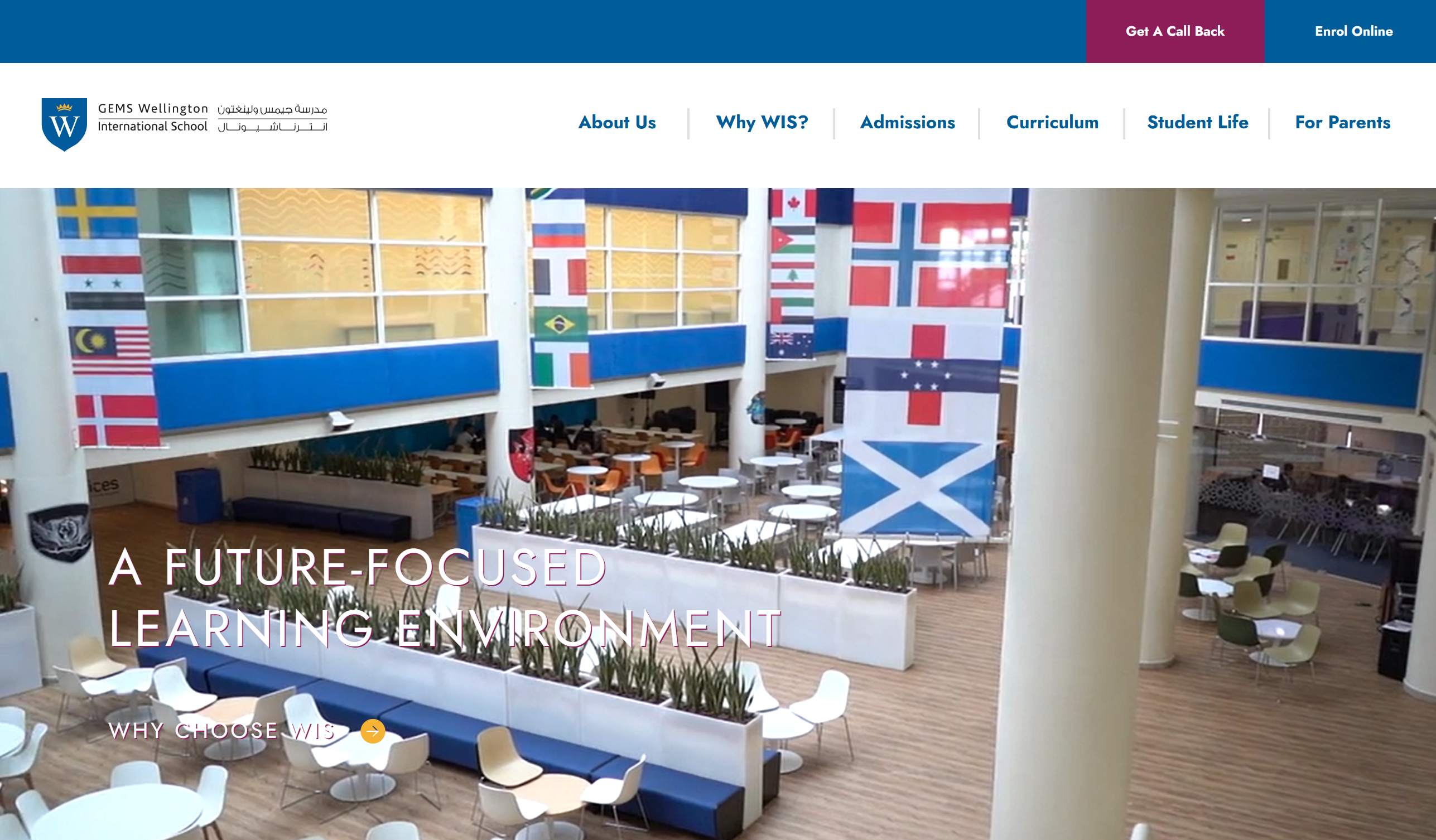
📍 Location: Al Sufouh
💰 Fees: AED 45,000–95,000/year
🏫 KHDA Rating: Outstanding
One of the most globally recognized best international schools in Dubai, GEMS Wellington blends technology and creativity. Its digital classrooms integrate AI-driven learning platforms for English, Math, and coding—aligning perfectly with Dubai’s “Smart Education” vision.
Top 3 Parent-Favorite Features:
- Innovation hubs and design-thinking curriculum
- Cambridge International A-levels
- AI and sustainability modules integrated into daily learning
3. Jumeirah College

📍 Location: Al Safa
💰 Fees: AED 40,000–85,000/year
🏫 KHDA Rating: Outstanding
Jumeirah College ranks among the top British curriculum schools in Dubai, balancing academics with emotional wellbeing programs. Parents praise its “open-door” culture, fostering student confidence and leadership.
Top 3 Parent-Favorite Features:
- Small class sizes for personalized learning
- Regular student mental health assessments
- Strong community involvement and eco-initiatives
4. Dubai International Academy (DIA)
.png)
.png)
📍 Location: Emirates Hills
💰 Fees: AED 45,000–90,000/year
🏫 KHDA Rating: Very Good
DIA is known for its IB curriculum and holistic education. It attracts expat families seeking inquiry-based, globally accredited programs.
Top 3 Parent-Favorite Features:
- IB continuum (PYP, MYP, and DP)
- Excellent university counseling support
- Multilingual learning options (Arabic, French, Spanish)
5. Repton School Dubai
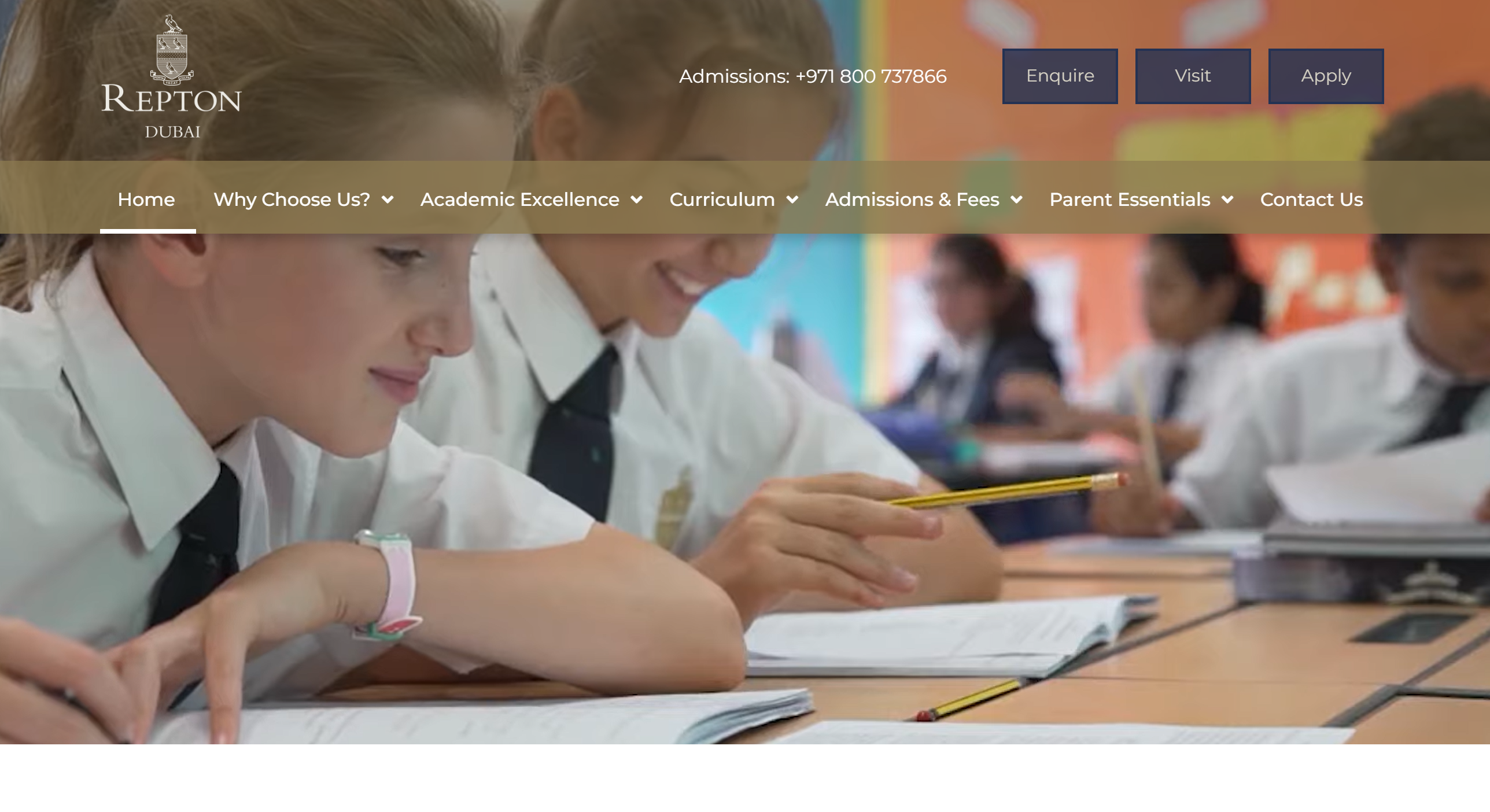
📍 Location: Nad Al Sheba 3
💰 Fees: AED 60,000–110,000/year
🏫 KHDA Rating: Outstanding
Founded in collaboration with Repton UK, this school mirrors British tradition and values. With sprawling campuses, AI-assisted classrooms, and state-of-the-art boarding facilities, it’s a leader in tech-enabled education.
Top 3 Parent-Favorite Features:
- AI-integrated STEAM program
- Elite-level sports and music academies
- University readiness pathways with mentorship
6. The Indian High School (CBSE Curriculum)
.png)
📍 Location: Oud Metha
💰 Fees: AED 6,000–12,000/year
🏫 KHDA Rating: Very Good
Dubai’s oldest and most respected Indian school, The Indian High School continues to deliver top-tier results at an affordable cost—earning it a reputation as one of the most affordable schools in Dubai with high ratings.
Top 3 Parent-Favorite Features:
- Excellent board exam track record
- Focus on values and community integration
- Low-cost yet high-quality education model
7. Nord Anglia International School Dubai

📍 Location: Al Barsha
💰 Fees: AED 55,000–100,000/year
🏫 KHDA Rating: Outstanding
Nord Anglia brings a global edge, offering collaborations with Juilliard and MIT. Its personalized learning program supports creativity and future-ready skills.
Top 3 Parent-Favorite Features:
- Global exchange programs
- Expert-led creative performance modules
- Excellent parent communication systems
8. Swiss International Scientific School

📍 Location: Al Jaddaf
💰 Fees: AED 60,000–130,000/year
🏫 KHDA Rating: Very Good
Renowned for its bilingual education, Swiss International integrates sustainability and innovation. Students are immersed in both English and French (or German), promoting linguistic flexibility and cognitive agility.
Top 3 Parent-Favorite Features:
- Dual-language immersion programs
- Eco-friendly campus design
- Boarding options with strong pastoral care
9. Horizon English School

📍 Location: Al Safa
💰 Fees: AED 35,000–60,000/year
🏫 KHDA Rating: Outstanding
This community-focused primary school is often a top choice for younger students. Its focus on emotional wellbeing, arts, and literacy development makes it stand out among early education institutions.
Top 3 Parent-Favorite Features:
- Nurturing environment with individual learning support
- Interactive STEM activities for primary years
- Outstanding reading and writing programs
10. King’s School Dubai
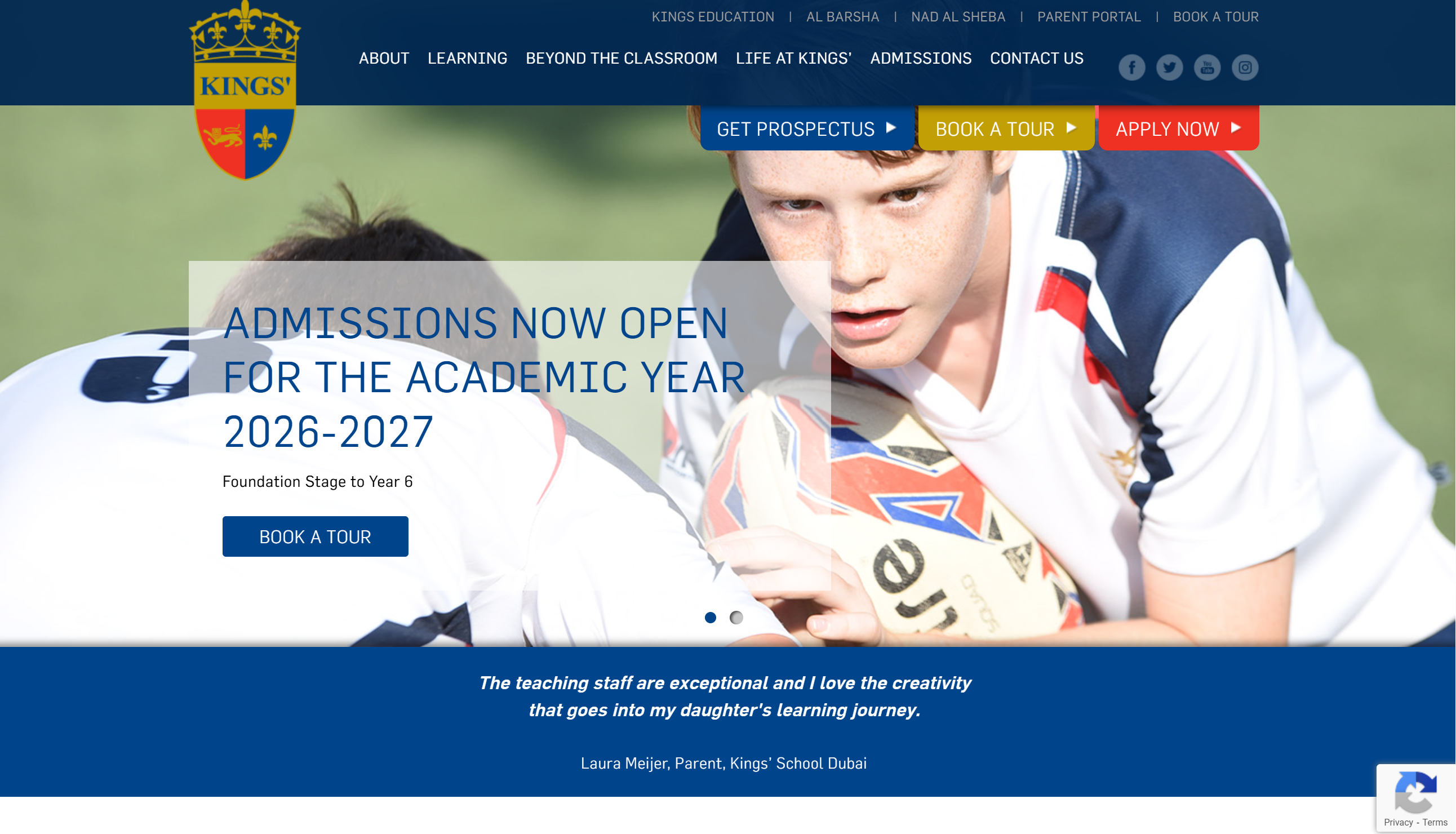
📍 Location: Umm Suqeim
💰 Fees: AED 50,000–100,000/year
🏫 KHDA Rating: Outstanding
King’s School emphasizes character development as much as academics. It’s known for fostering curiosity through play, debate, and inquiry-led education.
Top 3 Parent-Favorite Features:
- “Whole-child” learning philosophy
- Consistent KHDA “Outstanding” streak
- Active parent-teacher engagement
Cost of Education in Dubai: What Parents Should Expect
Dubai’s education standards come at a price—but there’s a school for every budget. The cost of international education in Dubai varies dramatically depending on curriculum, rating, and location.
According to Bayut’s School Fees Index 2025:
- British and IB schools average AED 50,000–100,000/year.
- CBSE and Indian curriculum schools range between AED 6,000–20,000/year.
- American and International schools average AED 70,000–130,000/year.
Tuition Fee Comparison (2025)
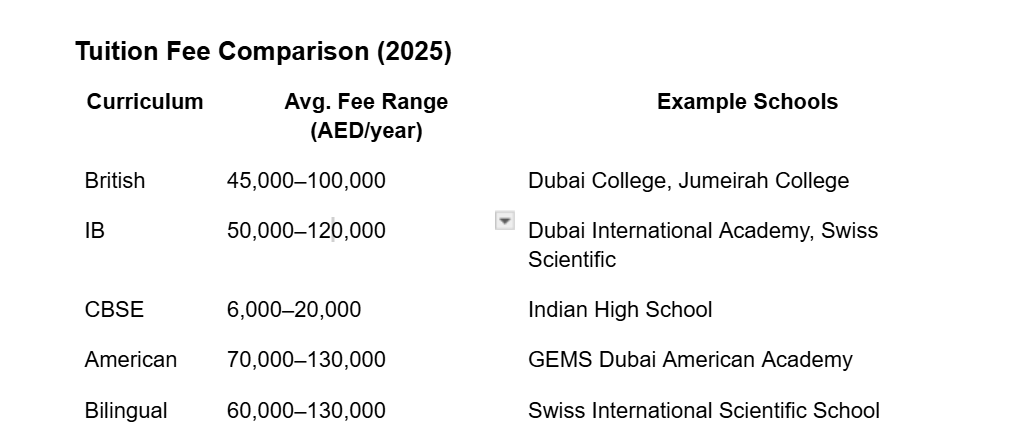
💡 Fact: As of 2025, Dubai’s private education market is valued at $2.8 billion, growing 8% annually as per Statista’s UAE Education Report.
While the numbers might seem steep, many schools offer scholarships, sibling discounts, and corporate tie-ups to make education more accessible.
Innovation & Multilingual Learning in Dubai Classrooms
Dubai’s classrooms in 2025 look very different from what they did a decade ago. From AI-enabled smartboards to bilingual curriculums and immersive virtual labs, innovation has become the foundation of modern learning.
According to The National UAE Education Report 2025, more than 68% of schools in Dubai now use AI-driven adaptive learning systems that personalize content based on student progress. This move aligns with the UAE’s Digital Education Strategy 2030, aiming to make the nation one of the most tech-forward education systems in the world.
AI and Technology Integration
Classrooms at top-rated institutions like GEMS Wellington, Nord Anglia, and Repton now include machine learning-based analytics dashboards that help teachers track student performance in real-time. These systems recommend lesson adjustments and even identify areas where students may need emotional support.
Meanwhile, virtual reality labs—particularly in Swiss International Scientific and DIA—allow students to explore history, anatomy, and astronomy as interactive simulations. It’s no longer about learning from books—it’s about experiencing knowledge.
The Rise of Bilingual & Multilingual Learning
One of Dubai’s strongest educational assets is its linguistic diversity. Schools like Swiss International Scientific School and Lycée Français International de Dubai offer dual-language education, with courses taught in English, Arabic, French, and German.
Research by KHDA Insights (2025) shows that students in bilingual environments develop 30% higher cognitive flexibility than their monolingual peers. The ability to think across languages not only improves academic performance but also nurtures cultural empathy—an essential skill in an expat-heavy city like Dubai.
Even CBSE and British schools are now expanding beyond standard Arabic lessons, integrating Mandarin and Spanish as secondary language electives.
The Future of Education in Dubai — Data, Design, and Diversity
If there’s one thing that defines Dubai’s education ecosystem, it’s its adaptability. The top 10 schools in Dubai are not just institutions—they’re innovation labs preparing students for global competitiveness.
1. Data-Driven Personalization
Schools are using predictive analytics to forecast student progress and design personalized learning pathways. AI algorithms analyze academic results, extracurricular participation, and even emotional wellbeing to create customized learning recommendations.
As someone deeply rooted in AI and digital transformation through Search Conversions, I see parallels between data-led education and AI-led marketing. In both worlds, personalization is no longer a luxury—it’s an expectation.
2. Sustainable Campuses
Sustainability is also emerging as a key differentiator. Swiss International Scientific School and Fairgreen International School have implemented carbon-neutral infrastructure powered by solar energy and smart resource management systems.
♻️ Fact: Dubai aims to make 50% of all schools eco-certified by 2030 under the “Green School Partnership Initiative” (Source: UAE Ministry of Education, 2025).
3. Global University Pathways
Students graduating from Dubai’s top-rated schools secure placements at top global universities—from Cambridge and Oxford to Harvard and Stanford. This international success rate reaffirms the city’s commitment to global standards and parent satisfaction.
Conclusion: The Dubai Education Model of the Future
The top 10 schools in Dubai represent more than academic prestige—they symbolize how education can evolve through diversity, technology, and community-driven excellence.
Dubai’s schools have mastered the art of balance: affordability meets innovation, academic rigor meets wellbeing, and tradition meets future-forward design.
As a parent and founder at App Genie AI, I see the city’s education landscape mirroring the same innovation cycle driving AI: continuous improvement, human-AI collaboration, and measurable impact.
Whether you’re a parent moving to Dubai, an expat planning long-term, or simply curious about global education trends, remember—great schools aren’t just chosen by rank. They’re chosen by fit, values, and vision.
Final Tip: Visit schools, talk to teachers, explore KHDA’s data, and make informed decisions based on both evidence and empathy.

